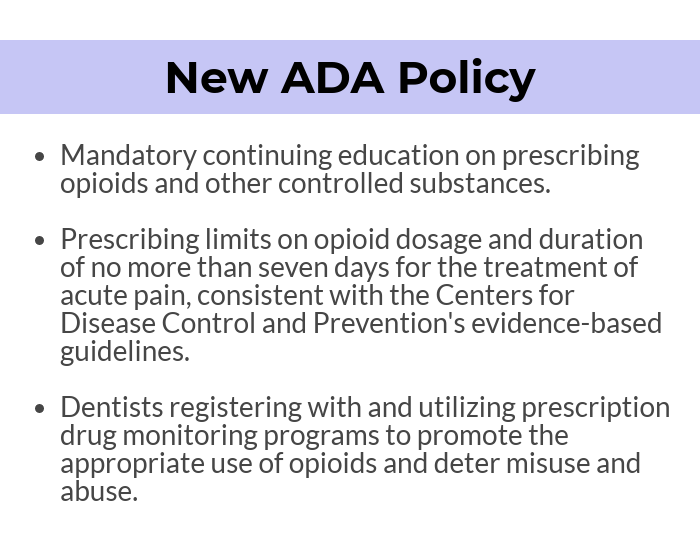Substance Use Disorder
Blog Post
Dentists Tackle Opioid Epidemic
A three-pronged strategy

Last month, the American Dental Association (ADA) announced a new policy on opioid prescription. This is the latest in a series of statements issued by the ADA in response to the prominent role of dentistry in the opioid epidemic. In addition to mandatory continuing education and prescription limits, the ADA indicated its support for “dentists registering with and utilizing prescription drug monitoring programs to promote the appropriate use of opioids and deter misuse and abuse.”
Prescription drug monitoring programs (PDMPs), which collect data on controlled substance prescriptions in each state, allow prescribers to view patients’ full prescription histories and identify potential patterns of abuse. This makes it much more difficult for individuals to “doctor shop” for opioids. In fact, a 2015 study in a dental urgent care center in New York found that mandatory PDMPs led to a 78% decrease in the quantity of opioids prescribed over a three-month period. The ADA recommendation is also consistent with the increased attention that PDMPs have gained across the medical community because of their potential to decrease high-risk opioid prescriptions.
But to be effective, PDMPs must be used. One barrier to use is the time burden involved in retrieving reports from the system. In a recent study, a group of researchers including LDI Senior Fellows Brandon Maughan and Dan Polsky examined the physician time burden of querying PDMPs and identified cost-reducing methods to increase physician use of PDMP reports. The authors found that the use of delegates, such as administrative staff, to acquire PDMP reports was more cost-effective than having physicians retrieve the reports themselves in most medical specialties. The study estimates that a large health care system (with 1,000 full-time equivalent physicians) can save more than $150,000 for selective usage and more than $900,000 for comprehensive usage of PDMPs by delegating these tasks. Moreover, the authors suggest that integration of PDMP data into electronic health records may further streamline use and reduce cost.
While there are distinct differences between medical and dental care delivery, it is certainly worthwhile to explore the potential of using delegates and PDMP-EHR integration in dental settings. Reducing the time burden of querying PDMPs may prove essential in promoting its widespread adoption in the dental community. In tandem with continuing education and evidence-based prescription limits, PDMPs can empower dentists to make significant contributions toward solving the opioid epidemic.
Tim Wang is a DMD/MPH Candidate, Class of 2021, at the University of Pennsylvania School of Dental Medicine.